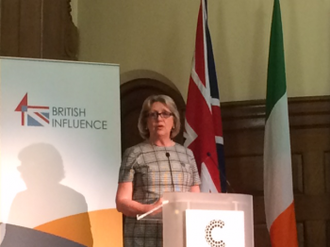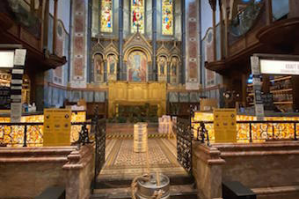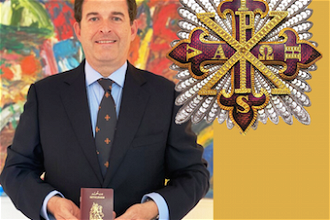Professor Mary McAleese warns of dangers of Brexit for Ireland

Professor Mary McAleese
Professor Mary McAleese, former President of Ireland, now Professor in Irish Studies at St Mary's University, was the keynote speaker at the launch of the British Influence Report on Brexit: The Irish Dimension, at Church House Westminster, last night. There was a moment of silence before the speeches for Jo Cox MP, a keen supporter of the campaign to remain in Europe.
Other speakers were Anthony Bailey, KGCN, OBE, Co-President of British Influence, Peter Wilding, Director of British Influence, Dr Charles Tannock MEP, Member of the European Parliament for London. The evening's discussion was chaired by Anthony Cary CMG, formerly British High Commissioner to Canada and British Ambassador to Sweden.
The prepared text of Professor McAleese's speech follows:
The EU referendum debate is now entering a critical final phase. It is essential that this phase is characterised by debate based on sober scholarship and credible analysis of the consequences if the UK were to leave the European Union.
One of the most overlooked and yet most immediate, extensive and profound effects of a Brexit would be on the island of Ireland. This timely report addresses the Irish dimension of a potential Brexit and I am grateful to British Influence and Anthony Bailey Consulting for taking seriously the concerns of Irish people and insisting that they be given due weight and space in this somewhat chaotic referendum debate. I ask all concerned to read it carefully and take its contents into consideration when weighing up the pros and cons of continuing membership of the EU.
The concerns of Ireland are legitimate and well- founded. They involve the economy, trade, immigration controls, the hardening of the land border, security, the weakening over time of the excellent current relationship between Ireland and the United Kingdom, the impact on the peace process, the impact on Union development of Britain's voice being absent from the European Union table.
The Irish dimension has been largely disregarded in this debate so far because a number of those in leadership positions who favour Brexit have been dismissive of the idea that Brexit would change how business, politics, security and border controls are currently conducted between Ireland and the United Kingdom. They have been quick to offer reassurances that nothing will change - that the huge volumes of trade between us which support 400000 jobs will continue exactly as before, that the current open road border between Northern Ireland and Ireland will continue exactly as before, that the 600,000 Irish born who live in Britain and the 300,000 Great Britain born who live in Ireland will be unaffected as will future generations. As this paper demonstrates clearly such reassurances are nothing more than wishful thinking at best and bluffing at worse.
Let us be absolutely clear Brexit would radically change the current legal context in which trade, travel, security, migration and politics take place between Ireland the United Kingdom. A new context would have to be constructed and not one single member of the Brexit campaign can tell us what that new context will look like. One thing we do know is that right now we simply cannot know what that context will be. Ireland's relationship with the United Kingdom would be thrown into a realm of uncertainly amounting to turmoil by Brexit - that much at least is certain.
It is remarkable that this threat would arise at the very moment in our convoluted history when for the first time we can say that the tragic past is behind us and we are building a future based on peace through partnership and good neighbourliness. Shared membership of the European Union has been central to arriving at this happier state of affairs but as this paper points out its role in recalibrating the British - Irish relationship is barely understood here in Britain. Its role in sustaining and developing the contemporary healthy relationship could be jeopardised by a Brexit. Instead of our politicians, diplomats, civil servants and experts meeting regularly around the Union table to thrash out common issues and growing the informed, respectful relationships that build trust, empathy and common cause, there is what British Ambassador Dominic Chilcott has described as the risk of "drift".
We cannot afford "drift". The peace Northern Ireland enjoys today is based on an international treaty sometimes called the Good Friday Agreement to which the United Kingdom and Ireland are signatories. Between us our governments and people, we jointly safeguard the Peace Process at many levels from common solidarity in the face of ongoing terrorist threats to cross-border security, policing and justice cooperation. Those current levels of cooperation are greatly facilitated by common membership of the EU and by European Union law. A good example mentioned in the report is the issue of extradition which for decades was problematic between these islands but which was elegantly resolved by the introduction of the European Arrest Warrant. What happens to that if one country is inside the EU and the other is not, at this remove is anyone's guess. There would be an immediate need to construct a new bilateral arrangement and even with the best will in the world as this report points out- "that is unlikely to be easily or quickly negotiated". There are many such issues to be contended within the event of a Brexit.
Before Ireland and the UK joined the EU I remember as a youngster, the customs controls at the land border, the long queues, the tariff differentials that made normal cross-border commerce difficult and interrupted normal life along the border. Today there are just open roads. Now that there is no longer a need for the large military security infrastructure along the border that there once was, the consequences of membership of the Union have become visible in the ease of access across the border.
Thousands of men and women live on one side and work on the other, hundreds of thousands travel across as consumers, tourists, traders in goods and services, visitors, business people, politicians, family, neighbours. A Brexit could harden that soft border - bringing new Customs and Excise rules, new controls on migration, slowing down traffic and trade, setting back relationships and the iconography of peace by years.
Membership of the EU has transformed Ireland economically from one of the poorest at joining to one of the wealthiest today. Ireland and the United Kingdom enjoy such high volumes of mutual trade that it is no exaggeration to say that a shock or threat to the basis on which that trade is done would present both jurisdictions with significant economic risks. Brexit provokes precisely such a shock or threat for all the trade between us is currently conducted within the free single European market of which we are both members.
No-one can say what the legal basis of such trade would be beyond a Brexit. That has to be a matter of worry for many of those businesses, employers, employees and customers who today rely on that trade and who conduct it within a known, settled legal framework. The worst of the recession and austerity of the past few years which put such pressure on trade, employment, incomes and indebtedness is just beginning to recede. No one needs more economic uncertainty or instability and yet Brexit voluntarily invites it by asking voters to abandon membership of the biggest structured common market in the world and to replace its extensive trading relationships with what? No-one knows the answer to that question and that not-knowing is a petrie dish for the incubation of viral uncertainty.
The economic uncertainty posed by a Brexit, as this report points up, would leave Northern Ireland particularly vulnerable in the agricultural and FDI sectors and at the loss of EU regional aid funding which currently amounts to one billion pounds. Also lost would be EU funding for infrastructure, funding in science and research and of course loss of certain entry to the single market. The introduction of border customs and migration controls would be disruptive of trade, tourism, inter-jurisdictional work and relationships for people living along the border. For a jurisdiction which is just now emerging from the damage wreaked by decades of violence and political stagnation there would need to be much more convincing reassurances about the economic benefits of a Brexit than have been offered to date. I have heard none that have convinced me so far.
I acknowledge that the Good Friday Agreement has created formal structures which would keep cross- border political dialogue alive and ongoing. It also has structures which keep dialogue between Dublin and Westminster ongoing but these bodies would find much of their time consumed by the consequences of a Brexit and the rush to create alternative structures to replace those common to EU members. They have not been stress-tested against such an unforeseen possibility and it remains to be seen how effective they can be in adapting to a changed legal and constitutional post- Brexit environment.
Ireland and Britain did not join the EU on the same day by accident but rather because they were so deeply entwined economically. Neither joined a 43-year project. We joined what was more likely to be a 443- year project. It was designed to completely change the longstanding culture of Europe from a battle ground of warring imperial, ideological and boundary vanities which routinely wasted the lives of its young people in wars that merely led to more wars. The future Europe was to be a company of friendly nations working together for peace through a collaborative partnership in which each exercised their sovereignty for the common good. It was a radical idea. It called us to focus on the higher gifts of consensus building and to resist the gravitational pull of conflict.
It still calls us to that project. We are still only in its opening chapters and it is still the best idea human kind has had. Through this debate the UK could make its mark on the Union not by leaving it but by staying and shaping it so that it stays faithful to its founding purpose and vision of a Europe whose children are equals, have freedom and peace, food on the table, jobs to go to and homes to return to, opportunities based on their abilities and efforts, children who live the lives eighteen year olds in trenches at the Somme once dreamed of and fought for but did not themselves enjoy.
The Erasmus student from Newry, Birmingham or Limerick lives the dream life of that eighteen-year-old so full of hope and generosity of spirit as he put on his uniform and travelled to the Western Front one hundred years ago from Belfast, Birmingham and Dublin. The man, woman or child from Limerick or London or Newry who can freely live, do business in or travel, in any of 27 other EU capital cities is living that dreamed of life. These dreams do not clatter together by coincidence or by chance. They are the result of effort, undertaken from generation to generation by those who believe that if we want a good, humanly decent world then we have to work together. The Europe of the first half of the twentieth century was a showcase of despair and human misery on a horrendous scale.
Thanks to the European Union, Europe has almost miraculously become a beacon of hope in a world where poverty, conflict and violence still lays waste too many lives. I firmly hope the United Kingdom will, through the referendum, recommit to the humanly uplifting vision which underpins the Union but which often gets lost in the day-to-day drudgery of Union building. I hope the Irish who have a vote will use it to ensure that the United Kingdom remains a member of the European Union, for that ensures our thankfully healthy contemporary partnership will continue to grow and develop to the benefit of Ireland, the United Kingdom and Europe.
See also: ICN 15 June 2016 - Brexit would cause 'turmoil' and 'radically change' relations with Ireland, says former Irish President www.indcatholicnews.com/news.php?viewStory=30306
Read the full report here: https://view.publitas.com/british-influence/brexit-what-would-happen-if-the-uk-voted-to-leave/page/1


















